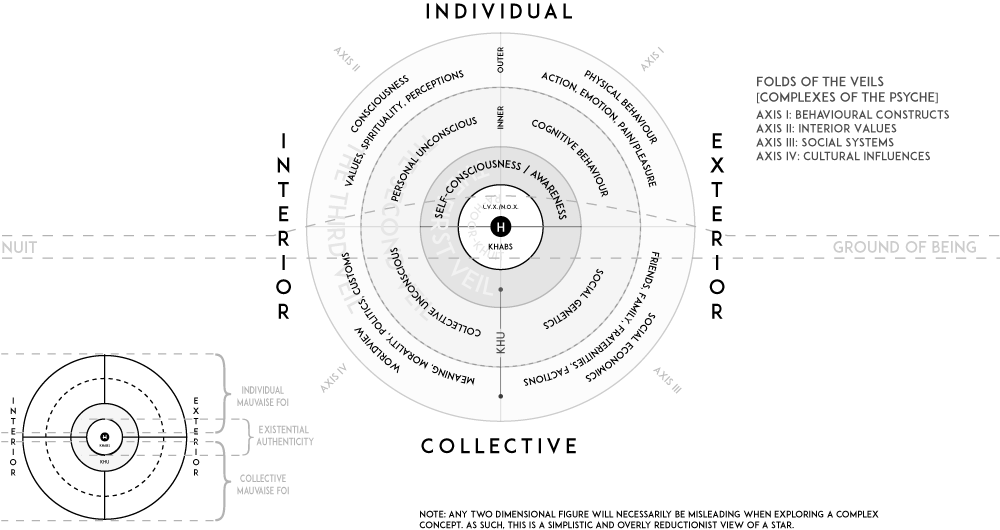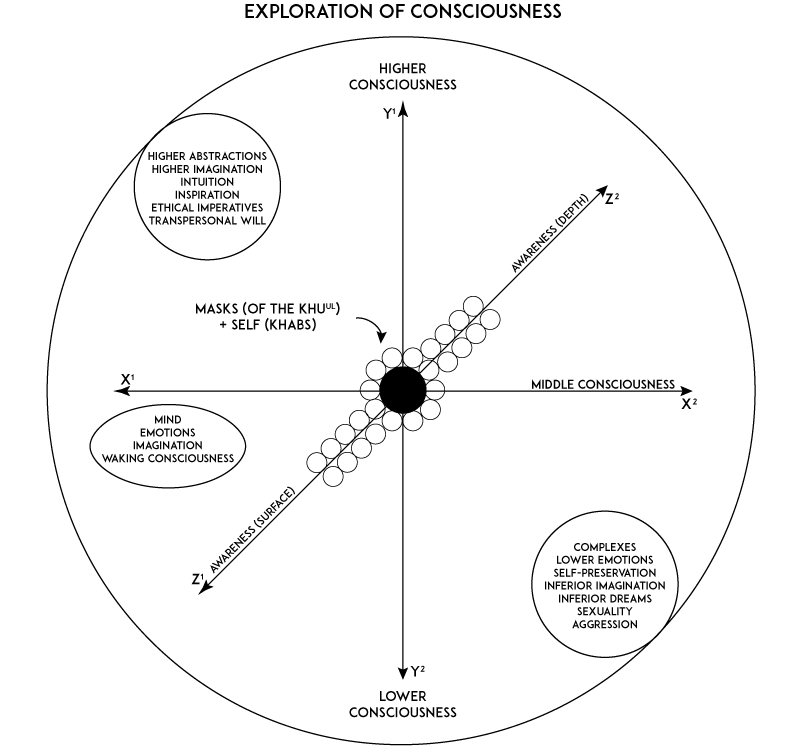Thelemic Psychology (Notes)
Go to: Notes to The Canons, Thelemic Religion (Notes), Thelemic Politics (Notes).
Introduction
As mentioned at the outset of this presentation, this abbreviated version of the Canons of Thelemic Philosophy & Religion is the outline of primary arguments concerning a systematic approach to Thelema that I hope will be as accessible to the lay person as it is to the expert.
Theoretical Orientation
Theoretical Orientation: A theoretical orientation is "an organized set of assumptions or preferences for given theories that provides a counselor or clinician with a conceptual framework for understanding a client’s needs and for formulating a rationale for specific interventions” (APA Dictionary of Psychology).
Premises of a Thelemic Theoretical Orientation
When I consider a theoretical orientation (the underlying assumptions and preferences) for a potential therapeutic approach, and when informed by my own understanding of Thelema, I find the following assumptions can be made:
- that individuals are neither inherently broken nor do they inherently lack wellness; and
- that individuals cannot be separated from their environment, experiences, or expressions, but must be engaged in each of these areas intimately through Love under Will; and
- that individuals are not static creatures but dynamic within objective (biological), subjective (psychological), intersubjective (cultural), and interobjective (systemic) dimensions of individual and collective perspectives; and
- that each therapeutic concern of the individual must be addressed throughout all four dimensions of the individual in some manner even if one or more dimension is predominant over others.
Certainly, these are merely some initial thoughts, but I think it's the start of a direction that is productive.
Thelemic Psychology: A Theoretical Orientation
In putting this all together into a coherent Thelemic theoretical orientation, it might read something like this:
- The human experience can be explicated simply as Perfection-experiencing-Imperfection for the purpose of accumulating change.
- There is only a single essential (authentic) self with a multiplicity of existential masks/garments or subpersonalities. There is no "higher" or "lower" Self/self dichotomy.
- Each individual and each experience of the individual is an existential composite of the four validity domains—objective, subjective, interobjective, and intersubjective.
- There are interior and exterior modes of individual and collective expression for the sole purpose of aggregating experience.
- Underlying these four domains is sense of self-awareness and a sense of direction (True Will) that can be discovered and assimilated to best express our purpose in life.
We cannot approach the individual in any therapeutic manner through a single lens. We must explore all aspects of the individual and the situation in which the individual finds themselves. All encounters of the Khu with external or internal stimuli are a matter of relationship.
The Alethiological (Cartography) Model

Masks of the Individual
Yet there are masked ones my servants: it may be that yonder beggar is a King. A King may choose his garment as he will: there is no certain test: but a beggar cannot hide his poverty. (AL 2.58)
Yet again, the Book of the Law offers us a view of the self, the King, that interior aspect of the individual, that is capable of changing their mask at will—much like Assagioli talks about being able to switch in and out of the subpersonalities without them taking over the self. The beggar is the one that is incapable of controlling those masks (subpersonalities). They're stuck. These masks are formed through the interaction of the veils of manifestation (complexes of the psyche) as subpersonalities informed by the work of Assagioli (and also by Internal Family Systems theory).
Shadow Work / Reintegration of Dysfunction
The Process of Shadow Work
- 3rd Person: Excavate the Dysfunction
- 2nd Person: Confront the Dysfunction
- 1st Person: Identify the Dysfunction
Therapeutic Methodologies
Axis I—the upper right—behavior constructs: For these areas, we want to talk about behavior modification: diet, exercise, yoga, medication if needed in some cases. This is where your medical practitioner of choice fits in, of course.
Axis II—the upper left—interior values: Psychotherapy, gestalt therapy, cognitive therapy, mysticism, magick, meditation, energy work — I could go on and on in this category. I think you get the picture here, though. Also, this is where a good therapist or psychologist comes into play. Again, I whole-heartedly agree with Israel Regardie who said that all occultists should see a therapist. My paraphrase, of course. I think that’s an excellent idea and follows along with the whole idea here of the ‘solution of complexes’ in the first place.
Axis III—the lower right—social systems: Relationship therapy, family therapy, past regressions and healing, trauma recovery. It’s been my experience that so much about social work is recovery work in just about every area of life starting in childhood and moving forward.
Axis IV—the lower left—cultural influences: Here we still see a lot of psychological work but from a different perspective. Deep down, Jungian work is a good start. On the surface, working through the various aspects of culture, privilege, morality, responsibility at all levels—which, in my opinion, is quite a difficult process for Thelemites to face and embrace.
Exploration of the Spectrums of Consciousness
This is a provisional [and incomplete] modification of Assagioli's "egg" model.

Attribution
No part of this publication may be used or redistributed for any purpose without the express prior written consent of the author.
Canons of Thelemic Philosophy & Religion © 1996-2024 by The Society for Thelemic Literature.

Go to: Notes to The Canons | Thelemic Psychology (Notes) | Thelemic Religion (Notes) | Thelemic Politics (Notes)
Comments
If you wish to comment about the materials here, feedback is welcome. Feel free to email questions, comments, and concerns regarding the Canons to admin@thelemicsociety.org.